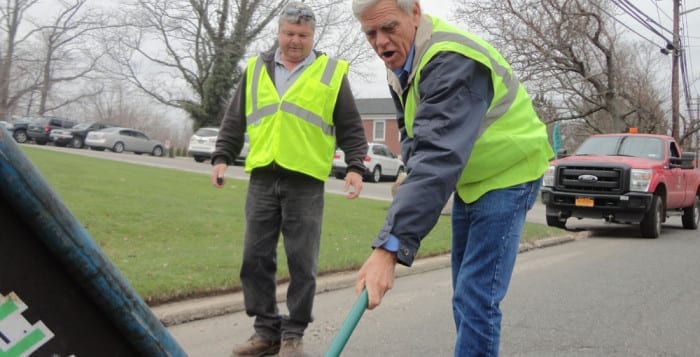Smithtown Highway Superintendent Glenn Jorgensen (R) has resigned and pleaded guilty to felony and misdemeanor charges in a scheme to alter road-repaving records from last year.
Jorgensen, 63, pleaded guilty in New York State Supreme Court in Riverhead on Thursday, Oct. 15, to a felony charge of offering a false instrument for filing and a misdemeanor charge of official misconduct as part of a plea deal with the Suffolk County District Attorney’s Office.
He will be sentenced on Dec. 11 to four months of jail but will serve an alternative sentence in lieu of jail of 570 hours of community service, and will receive three years probation, according to Robert Clifford, spokesman for the Suffolk County District Attorney’s office.
“This disposition compels the defendant to resign from his elected position and his admission of guilt before the court confirms the facts uncovered during the investigation,” Clifford said in a statement. “As the Superintendent of Highways Mr. Jorgensen knowingly had false information about the paving of town roads filed as an official town record, and he knowingly directed that inaccurate information be filed to make it appear as though the roadwork met state mandatory specifications.”
Vecchio’s office confirmed that Jorgensen resigned from his position as of Friday, Oct. 16.
In April, Jorgensen was charged with tampering with public records, falsifying business records, filing false records, official misconduct and grand larceny, Suffolk County District Attorney Tom Spota said. Initially, Jorgensen pleaded not guilty to the charges.
At the time, Jorgensen, of St. James, was accused of altering road construction reports and stealing a public work order for an improper repaving. He tried to conceal his approval of paving at least eight Smithtown streets in freezing temperatures last November and then directed a highway foreman to alter the record of the weather conditions done during the repaving work.
District attorney detectives found work orders for the improper repaving jobs hidden under Jorgensen’s bed at his Hope Place residence.
“State Department of Transportation construction standards dictate asphalt must not be applied to a road surface in freezing temperatures, and in fact, the town’s own engineer has said repaving in freezing weather would result in the asphalt falling apart,” Spota said in an April statement. “The repaving of a residential street doesn’t happen that often and when it does, residents are paying for a job done correctly, not a faulty repaving that will soon need pothole repair work.”
Supervisor Pat Vecchio (R) has said he felt Jorgensen should resign from his post amid the slew of accusations.
“It is a sad occurrence and I will have no comment other than I have sympathy for Mr. Jorgensen and his family,” Vecchio said in an email on Tuesday morning.
Jorgensen had also been accused of sexual harassment involving his former secretary. The town was issued a notice of claim alleging he sexually harassed her in December. The claim also alleged he had taken her out to job sites, out to eat and eventually fired her after finding out she was dating an employee of the highway department. Earlier this year, Vecchio publicly called Jorgensen out for taking his new secretary out to job sites, going against the Suffolk County Civil Service’s job description for the position.
“It seems to me that you are either not comprehending why the position exists, you have a disregard for civil service law or you are mocking the town board and the public,” Vecchio said of Jorgensen bringing his new secretary to the job site in April.
Smithtown Democratic Committee Chairman Ed Maher also called for Jorgensen’s resignation in April, and said it was an outrage that the taxpayers were funding his salary.
Jorgensen worked for the Smithtown Highway Department for 37 years, and won election for highway superintendent in 2009 and 2013.
Jorgensen’s attorney could not be reached for comment this week.








